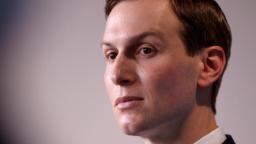
His comments came hours after a White House ceremony, dubbed the Abraham Accords, marked the first Middle East White House peace signing in more than two decades.
“I think we had a very good breakthrough. What’s happened is in the Middle East, the deals have been so well received. That’s what helped Bahrain go quickly. They saw how well the deal was received in the United Arab Emirates and throughout the Muslim world. The people in the region are tired of war,” Kushner told CNN’s Wolf Blitzer on “The Situation Room.”
“They’re tired of conflict. They want to move forward, and they see bridging this gap and getting a better understanding between countries as a way to move forward.”
Asked specially about the prospect of Saudi Arabia recognizing Israel, Kushner pointed to Trump’s relationship with the country’s leadership and touted “a lot of changes” in the last three years.
“Quite frankly, also, when we put out our vision for peace you saw the Palestinian leadership reject it before it even came out — before they knew what was in it,” he said.
“So people are getting a little tired with the tactics played by the Palestinian leaders. They want to help the Palestinian people, but they’re not going to allow them to hold back the national interest of all these different countries.”
Trump has praised Kushner for his role in securing the deal to bring the UAE and Israel together to achieve normalization, which entails the establishment of political and economic ties for the first time in both countries’ histories.
“We’re here this afternoon to change the course of history. After decades of division and conflict we mark the dawn of a new Middle East,” Trump said earlier Tuesday. “Thanks to great courage of the leaders of these three countries, we take a major stride toward a future in which people of all faiths and backgrounds live together in peace and prosperity.”
Kushner said administration staffers at the ceremony were tested beforehand and maintained that people know their “risk profile” at this point in the pandemic.
“At the end of the day in America we still have to figure out how to live our lives,” he said.
“We’re not going to all lock ourselves in our home because of the pandemic. I think we know a lot more today. We know who is at risk, we know how to mitigate the risk and we’re all going to act accordingly.”